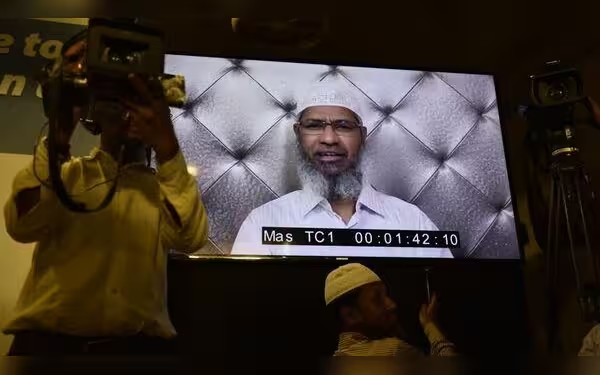Saturday, November 16, 2024 07:24 PM
Zakir Naik's Controversial Meeting With Lashkar-E-Tayyiba Terrorists In Pakistan
- Zakir Naik embraces Lashkar-e-Tayyiba members during Pakistan visit.
- Naik's ties to terrorism raise global concerns.
- Indian government investigates Naik for promoting extremism.
 Image Credits: menafn
Image Credits: menafnZakir Naik's meeting with Lashkar-e-Tayyiba in Pakistan raises serious global concerns about his influence and ties to terrorism.
In a recent development that has raised eyebrows across the globe, controversial Islamic preacher Zakir Naik made a 'peace' visit to Pakistan, where he was seen meeting with members of the UN-designated terror group Lashkar-e-Tayyiba (LeT). This meeting included notable figures such as Commander Muzammil Iqbal Hashmi and Harris Dhar, both of whom are linked to the organization implicated in numerous terror attacks, including the infamous 2008 Mumbai attacks.
The viral video of this encounter shows Naik embracing the terrorists, which has sparked serious concerns regarding his influence and connections with extremist groups. The Lashkar-e-Taiba has long been associated with violence and terrorism, and Naik's association with them raises questions about his intentions and the message he is promoting.
Prior to this mosque event, members of the LeT, including Faisal Nadeem and Muzammil Hashmi, organized an online campaign to promote Naik's visit, indicating a level of support and coordination that is alarming. This situation has not gone unnoticed, as Indian External Affairs Minister S. Jaishankar recently commented on Pakistan's long-standing ties to terrorism, emphasizing that “actions have consequences.”
Naik, who has been living in Malaysia since 2016, fled India following a case filed against him by the National Investigation Agency (NIA) under the Unlawful Activities (Prevention) Act. He is currently under investigation for alleged terrorist activities and is wanted in India for charges related to spreading communal hatred and money laundering. His controversial speeches, broadcasted through his channel, Peace TV, have garnered him a following of over 20 million, but they have also drawn criticism for allegedly inspiring violence.
One of the bombers involved in the 2016 Dhaka café attack reportedly claimed to have been influenced by Naik's speeches. Furthermore, some youths who joined the Islamic State have stated that they were drawn to the group after encountering Naik's rhetoric. Despite these serious allegations, Naik has consistently denied any involvement in these incidents.
In 2022, the Indian government declared Naik's Islamic Research Foundation unlawful, citing his promotion of hate and disharmony. His speeches have been deemed objectionable for glorifying known terrorists and encouraging conversion and terrorism. The implications of his actions and associations are profound, as they not only affect the perception of Islam but also contribute to the ongoing challenges of combating extremism.
As the world watches these developments unfold, it is crucial to reflect on the broader implications of such meetings. The normalization of interactions between religious figures and known terrorists can have far-reaching consequences, potentially undermining efforts to promote peace and understanding. It is essential for communities and governments to remain vigilant and proactive in addressing the roots of extremism, ensuring that the message of peace prevails over the rhetoric of hate.













